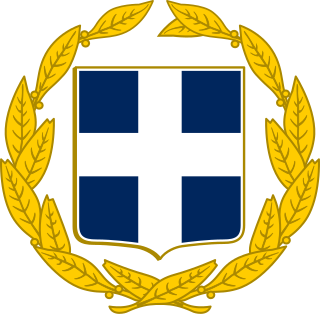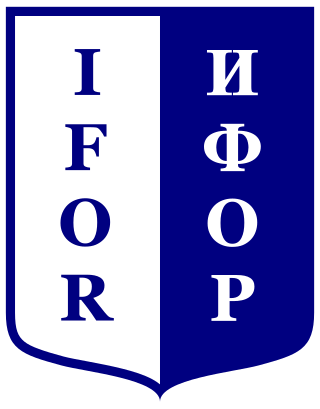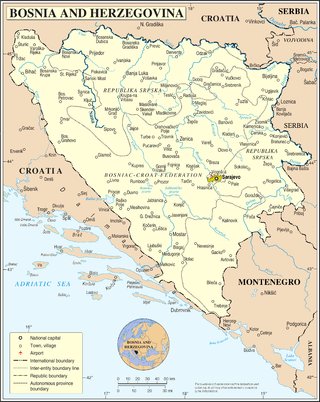
The Armed Forces of Bosnia and Herzegovina is the official military force of Bosnia and Herzegovina. The BiH armed forces were officially unified in 2005 and are composed of two founding armies: the Bosniak-Croat Army of the Federation of Bosnia and Herzegovina (VFBiH) and the Bosnian Serbs' Army of Republika Srpska (VRS).

The Hellenic Armed Forces are the military forces of Greece. They consist of the Hellenic Army, the Hellenic Navy, and the Hellenic Air Force.

The Implementation Force (IFOR) was a NATO-led multinational peace enforcement force in Bosnia and Herzegovina under a one-year mandate from 20 December 1995 to 20 December 1996 under the codename Operation Joint Endeavour.

The Stabilisation Force (SFOR) was a NATO-led multinational peacekeeping force deployed to Bosnia and Herzegovina after the Bosnian War. Although SFOR was led by NATO, several non-NATO countries contributed troops. It was replaced by EUFOR Althea in December 2004.

The Common Security and Defence Policy (CSDP) is the European Union's (EU) course of action in the fields of defence and crisis management, and a main component of the EU's Common Foreign and Security Policy (CFSP).

Operation Althea, formally the European Union Force Bosnia and Herzegovina (EUFOR), is a military deployment in Bosnia and Herzegovina to oversee the military implementation of the Dayton Agreement. It is the successor to NATO's SFOR and IFOR. The transition from SFOR to EUFOR was largely a change of name and commanders: 80% of the troops remained in place. It replaced SFOR on 2 December 2004.
An international decoration is a military award which is not bestowed by a particular country, but rather by an international organization such as the United Nations or NATO. Such awards are normally issued as service medals, for participation in various international military operations, and not for specific acts of heroism or bravery.

The Peace Implementation Council (PIC) is an international body charged with implementing the Dayton Peace Agreement for Bosnia and Herzegovina. The Council was established at an implementation conference held in London, United Kingdom, on December 8 and 9, 1995, subsequent to the completion of the negotiations of the accord the preceding month. The Council is, in effect, the realisation, through the High Representative for Bosnia and Herzegovina, which is appointed by the Council, of the international community's governance of Bosnia and Herzegovina after signature of the Dayton Agreement. The international control over Bosnia and Herzegovina is to last until the country is deemed politically and democratically stable and self-sustainable.

The Berlin Plus agreement is the short title of a comprehensive package of agreements made between NATO and the EU on 16 December 2002. These agreements were based on conclusions of NATO's 1999 Washington summit, sometimes referred to as the CJTF mechanism, and allowed the EU to draw on some of NATO's military assets in its own peacekeeping operations.

European Union Force Chad and the Central African Republic, also EUFOR Tchad/RCA after the French, was the European Union mission in Chad and the Central African Republic (CAR), authorised in late 2007. EUFOR Chad/CAR was authorised under the same United Nations Security Council resolution that mandated MINURCAT, a UN force tasked with training police and improving judicial infrastructure.
United Nations Security Council Resolution 1948, adopted unanimously on November 18, 2010, after recalling previous resolutions on the conflicts in the former Yugoslavia, including resolutions 1031 (1995), 1088 (1996), 1423 (2002), 1491 (2003), 1551 (2004), 1575 (2004), 1639 (2005), 1722 (2006), 1764 (2007), 1785 (2007), 1845 (2008), 1869 (2008) and 1895 (2009), the Council extended the mandate of EUFOR Althea in Bosnia and Herzegovina for an additional year until November 18, 2011.

United Nations Security Council resolution 1639, adopted unanimously on 21 November 2005, after recalling previous resolutions on the conflicts in the former Yugoslavia, including resolutions 1031 (1995), 1088 (1996), 1423 (2002), 1491 (2003), 1551 (2004) and 1575 (2004), the Council extended the mandate of EUFOR Althea in Bosnia and Herzegovina as a legal successor to the Stabilisation Force (SFOR) for a further twelve months.

The Common Security and Defence Policy Service Medal is an international military decoration awarded to individuals, both military and civilian, who have served with CSDP missions. Since the 1990s the European Union has taken a greater role in military missions both in Europe and abroad. These actions were taken under the Common Security and Defence Policy (CSDP), which is implemented by the European Union Military Staff, a department of the EU. To recognize service in these missions the EU authorized the creation of a medal with a common obverse and reverse, to which clasps featuring the missions' name are attached to the ribbon bar.

United Nations Security Council Resolution 1722, adopted unanimously on November 21, 2006, after recalling previous resolutions on the conflicts in the former Yugoslavia, including resolutions 1031 (1995), 1088 (1996), 1423 (2002), 1491 (2003), 1551 (2004), 1575 (2004) and 1639 (2005), the Council extended the mandate of EUFOR Althea in Bosnia and Herzegovina as a legal successor to the Stabilisation Force (SFOR) for a further twelve months.
United Nations Security Council Resolution 2019 was unanimously adopted on 16 November 2011, and approved the mandate of European force in Bosnia and Herzegovina.

European Union Force RCA, commonly referred as EUFOR RCA, is the United Nations-mandated European Union peacekeeping mission in Bangui, capital of the Central African Republic. The goal of the mission is to stabilize the area after more than a year of internal conflict. Agreement about the mission was reached in January 2014, and the first operations started at the end of April. The mission ended its mandate after nearly a year on 15 March 2015.

This article outlines the defence forces of the European Union (EU), which implement the EU's Common Security and Defence Policy (CSDP) in CSDP missions. There are two categories of EU multinational forces: ones that have been established intergovernmentally and made available to the CSDP through article 42.3 of the Treaty on European Union (TEU), such as the Eurocorps; and the EU Battlegroups, established at the EU level.
This article outlines the command and control structure of the European Union's missions, which are deployed as part of the Common Security and Defence Policy (CSDP). This structure ranges from the political strategic level to the tactical level.












